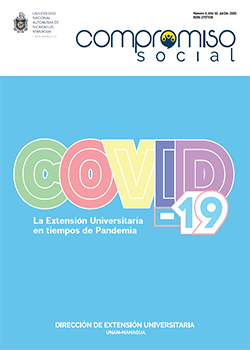The process of continuous improvement in postgraduate programs: the case of the Master’s degree of CIRA/UNAN-Managua
DOI:
https://doi.org/10.5377/recoso.v2i4.13474Keywords:
continuous improvement, self- evaluation, graduate programs, accreditation, regionalityAbstract
Resistance to continuous improvement processes in higher education programs is a latent problem to a lesser or greater degree in public and private universities in Latin America. However, this has been overcome through i) understanding the aims and objectives of these processes; ii) conducting specific training in quality management and continuous evaluation of higher education; iii) the design and appropriation of evaluation methodologies and tools; iv) the implementation of strategies and developed and planned mechanisms for this purpose; v) recognition of the importance of the scientific and social contribution of programs for sustainable development; and vi) the appreciation of the benefits obtained for the institutions of higher education. Within the framework of the self-evaluation and accreditation processes of the postgraduate programs of the IES, the integrative experience of these processes is presented through the learning lived during the six cycles of the Central American Regional Master’s Program in Water Sciences with emphasis on quality of water from the Center for Research on Aquatic Resources of Nicaragua (MCA, CIRA / UNAN-Managua), as an example of the implementation and appropriation of these processes following the fundamental steps to achieve an articulation of the academic, administrative and financial sustainability needs and priorities of postgraduate programs, which is pertinent and adequate with the demands of Nicaraguan society. As an evidence of the progress made in the process of continuous improvement of the MCA, it is worth mentioning that it was the first Nicaraguan postgraduate program accredited by CSUCA-SICAR (2008-2013), which in turn has allowed recognition to academic quality of the program at the regional level, a greater academic mobility of Professors and students; as well as a greater opportunities to ensure postgraduate sustainability, among other opportunities.
939
Downloads
Published
How to Cite
Issue
Section
License
Copyright (c) 2020 Universidad Nacional Autónoma de Nicaragua, Managua (UNAN-Managua)

This work is licensed under a Creative Commons Attribution-NonCommercial-ShareAlike 4.0 International License.




